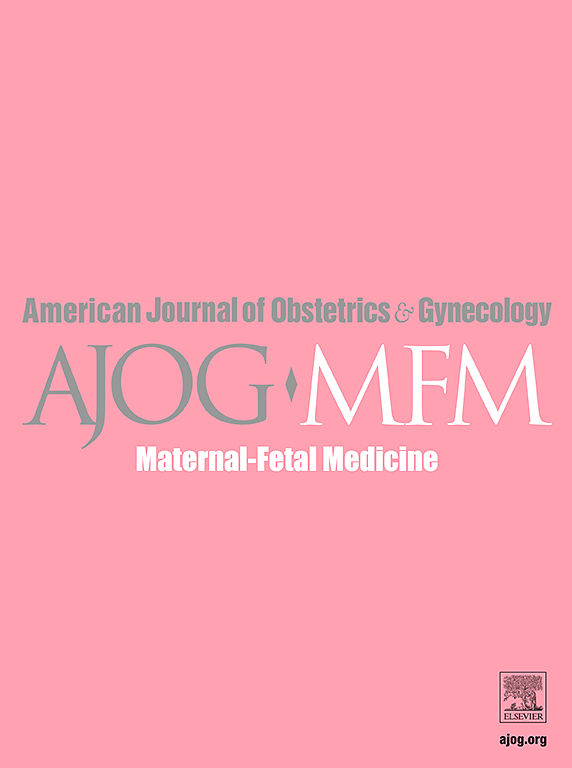早产晚期的早产儿猝死综合症:期待管理的论据。
IF 3.8
2区 医学
Q1 OBSTETRICS & GYNECOLOGY
American Journal of Obstetrics & Gynecology Mfm
Pub Date : 2025-03-01
DOI:10.1016/j.ajogmf.2024.101563
引用次数: 0
摘要
早产胎膜早破(PPROM)与新生儿的重大风险有关。当胎膜早破发生在早产晚期(妊娠 34 0/7 周至 36 6/7 周之间)时,最佳分娩胎龄尚不明确,且因地区而异。2020 年,美国妇产科医师学会(ACOG)发布指南,指出预产期管理和立即分娩都是合理的选择。从历史上看,对 34 周后 PPROM 的预产期管理和立即分娩的研究支持立即分娩,因为观察到感染并发症的风险增加,但对新生儿结局没有任何益处。然而,这些研究的规模都很小,而且力量不足,无法检测出新生儿预后的显著差异。在这篇综述中,我们研究了六项随机对照试验和两项随机对照试验的荟萃分析,这些研究调查了晚期早产 PROM 的预产期管理与立即分娩对新生儿和产妇预后的影响。本分析包括三项最新的随机对照试验(PPROMEXIL、PPROMEXIL2 和 PPROMT)和两项荟萃分析,结果表明,预产期管理可降低呼吸窘迫综合征的风险和新生儿重症监护室的入院率。但由于各试验中对绒毛膜羊膜炎的定义不尽相同,因此各试验结果的通用性并不明确。一项儿童结局研究的附加分析表明,对晚期早产儿 PROM 进行预产期管理后出生的婴儿在神经发育方面没有显著差异,一项经济分析发现,预产期管理与较低的分娩和新生儿成本相关。总之,如果母体和胎儿状态稳定,且没有预产期管理的禁忌症,我们支持对晚期早产 PROM 进行预产期管理,但不能超过孕 37 0/7 周。本文章由计算机程序翻译,如有差异,请以英文原文为准。
PPROM in the late preterm period: an argument for expectant management
Preterm prelabor rupture of membranes (PPROM) is associated with significant neonatal risks. When PPROM occurs during the late preterm period (between 34 0/7 and 36 6/7 weeks gestation), the optimal gestational age for delivery is unclear and varies by regional practice. In 2020 the American College of Obstetrician and Gynecologists (ACOG) published guidelines indicating that both expectant management and immediate delivery were considered reasonable options. Historically, studies that examined the topic of expectant management versus immediate delivery of PPROM after 34 weeks supported immediate delivery based on an observed increased risk of infectious complications without any benefit to neonatal outcome. However, these studies were small and were underpowered to detect a meaningful difference in neonatal outcomes. In this review, we examine 6 randomized controlled trials and 2 meta-analyses of randomized controlled trials that investigated neonatal and maternal outcomes of expectant management versus immediate delivery of late preterm PROM. Included in this analysis are 3 recent randomized controlled trials (PPROMEXIL, PPROMEXIL2, and PPROMT) and 2 meta-analyses that demonstrate a decreased risk of respiratory distress syndrome and NICU admission rate with expectant management. This is counterbalanced by an increased risk of chorioamnionitis with expectant management, but definitions of chorioamnionitis are variable in the trials with unclear generalizability of the outcome across the trials. Additional analysis with a childhood outcome study showed no significant difference in neurodevelopment in infants born to expectant management of late preterm PROM, and an economic analysis found that expectant management was associated with lower delivery and neonatal costs. Overall, we support expectant management of late preterm PROM if maternal and fetal status are stable and there are no contraindications to expectant management but not extending beyond 37 0/7 weeks gestation.
求助全文
通过发布文献求助,成功后即可免费获取论文全文。
去求助
来源期刊

American Journal of Obstetrics & Gynecology Mfm
Medicine-Medicine (all)
CiteScore
7.40
自引率
3.20%
发文量
254
审稿时长
40 days
期刊介绍:
The American Journal of Obstetrics and Gynecology (AJOG) is a highly esteemed publication with two companion titles. One of these is the American Journal of Obstetrics and Gynecology Maternal-Fetal Medicine (AJOG MFM), which is dedicated to the latest research in the field of maternal-fetal medicine, specifically concerning high-risk pregnancies. The journal encompasses a wide range of topics, including:
Maternal Complications: It addresses significant studies that have the potential to change clinical practice regarding complications faced by pregnant women.
Fetal Complications: The journal covers prenatal diagnosis, ultrasound, and genetic issues related to the fetus, providing insights into the management and care of fetal health.
Prenatal Care: It discusses the best practices in prenatal care to ensure the health and well-being of both the mother and the unborn child.
Intrapartum Care: It provides guidance on the care provided during the childbirth process, which is critical for the safety of both mother and baby.
Postpartum Issues: The journal also tackles issues that arise after childbirth, focusing on the postpartum period and its implications for maternal health. AJOG MFM serves as a reliable forum for peer-reviewed research, with a preference for randomized trials and meta-analyses. The goal is to equip researchers and clinicians with the most current information and evidence-based strategies to effectively manage high-risk pregnancies and to provide the best possible care for mothers and their unborn children.
 求助内容:
求助内容: 应助结果提醒方式:
应助结果提醒方式:


